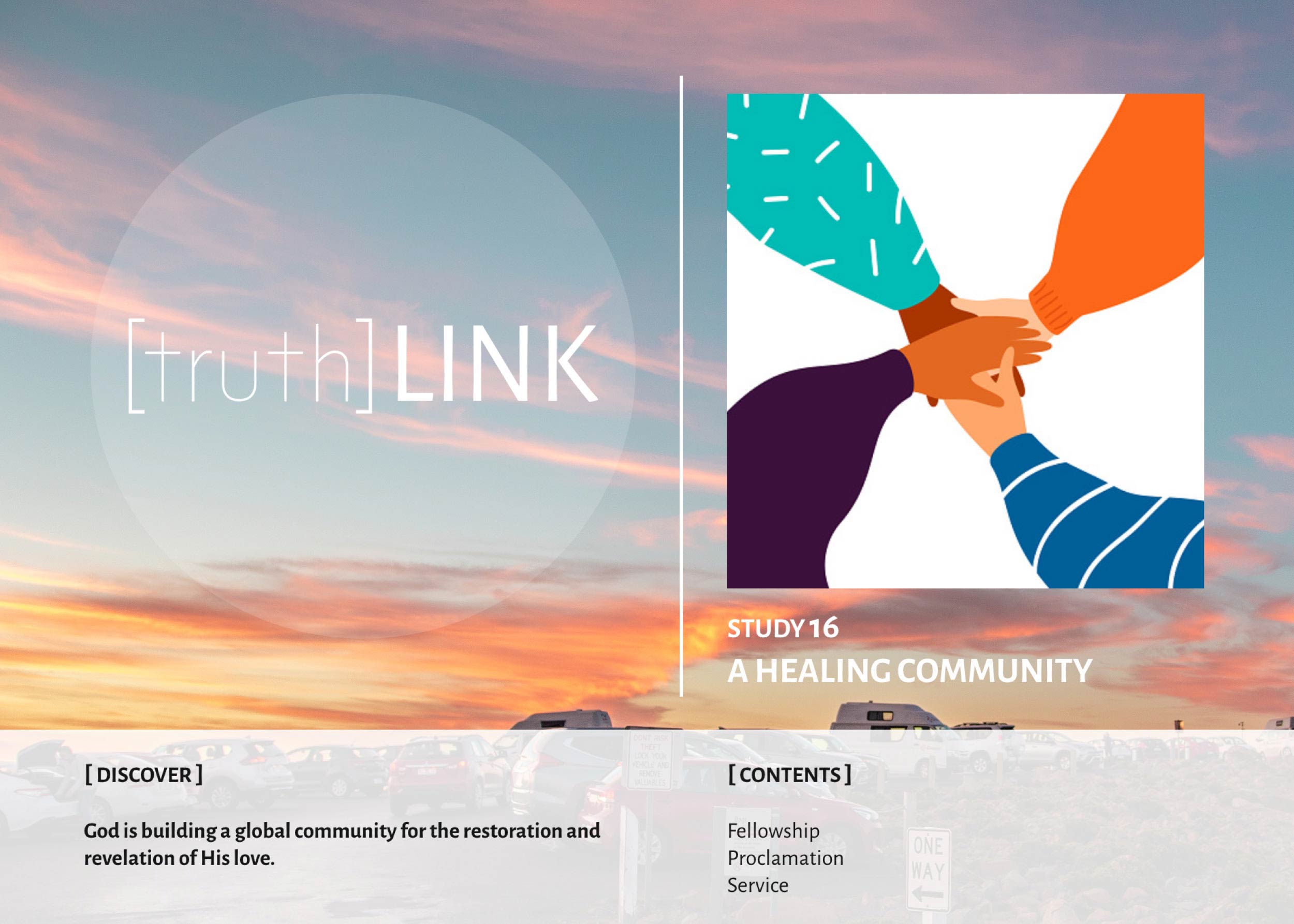
Fellowship
At our physical birth, we are born into a family. This is a good thing because we need a family in order to grow and develop as human beings. The same is true when we are spiritually reborn. We are born again into the spiritual family of God in order for our spiritual growth to be facilitated.
As we discovered in study guide 2, God is a communitarian being, an other-centered friendship, a fellowship of three who are one. Then, we discovered in study guide 3 that God made humanity in His own image. We logically deduce from these two foundational truths that human beings exist for fellowship, that we are social creatures, psychologically, emotionally, and biologically engineered for self-giving relationships. In study guide 4 we discovered that the sin problem resulted in fractured relationships between humans and their Creator, and between ourselves as fellow human beings. Sin, we learned, is relational violation that leads to relational discord. The plan of salvation, which we explored in study guides 6 through 15, is all about restoring those relationships. In this lesson we will discover that God is building a global community for the restoration and revelation of His love. The Bible calls this community, “the church.”
Let’s begin with 1 John 1:1-4. In verses 1 and 2 John testifies that he and others had an encounter with the “Word of Life,” Jesus Christ. Then, in verses 3 and 4 he comes to the incredible point of it all:
“That which we have seen and heard we declare to you, that you also may have __________________ with us; and truly our __________________ is with the Father and with His Son Jesus Christ. And these things we write to you that your _____ may be _____.”
The word here translated “fellowship” is koinōnia in Greek, and it means community, intimacy, shared life, connected living. John is telling us that koinōnia with one another in the context of koinōnia with God leads to fullness of joy, or off-the-charts happiness. So our first point regarding the church is simply this: it is a community of believers who have fellowship with one another and with God.
Now let’s go a little deeper and discover the practical aspects of the church’s fellowship. Read and discuss Acts 2:40-47 and notice four key actions of the early church:
1. Those who come into the fellowship of the church are being “saved” (verses 40 and 47). The Greek word here is sozo, which, as we discovered in study guide14 fourteen, literally means to heal, restore, make whole. So the church is a fellowship in which human beings are undergoing a healing process and becoming whole.
2. Those who come into the fellowship of the church “continue steadfastly in the apostles’ doctrine and in fellowship, in the breaking of bread, and in prayers.” The church is a fellowship in which the truths of Scripture are studied and taught, and the people spend time together and pray together.
3. Those who come into the fellowship of the church deal in a benevolent manner with their material “possessions.” They live this way in order to help those in “need.”
4. As a result of this kind of fellowship, the early church had “favor with all the people.” The church was attractive. Its fellowship revealed to the world a way of life that was characterized by love for God and love for people.
This is what koinōnia looks like in action. What a beautiful thing to be a part of!
Proclamation
The church does not exist for itself. It is called to “proclaim” a message—not a mere recitation of theological facts, but a living message that is informed and formed by its koinōnia with God:
“You are a chosen generation, a royal priesthood, a holy nation, His own special people, that you may ___________ the __________ of _____ who called you out of darkness into His marvelous light” (1 Peter 2:9).
Notice that the message of the church is a positive proclamation of God’s “praises.” In other words, the message is about Him—the attractive loveliness of His good character—and it has the effect of awakening praise in human hearts as they come to know Him as He really is. The truths the church holds and proclaims are not abstract ideas, academic theories, or creedal tenets to be argued and debated, but rather a composite picture of God’s praise-worthy character, each doctrine contributing to the portrait. Paul agrees with Peter regarding the content of the church’s message, defining it as “the light of the gospel of the glory of Christ, who is the image of God . . . the light of the knowledge of the glory of God in the face of Jesus Christ” (2 Corinthians 4:4, 6). Said another way, the message the church is called to proclaim is the beauty of God’s character of self-giving love as revealed in Christ.
It follows, then, that the spirit with which church members relate to one another, and the attitude with which they speak the truth to the world, is of crucial importance. Ephesians 4:1-16 makes this clear. Move through the passage verse by verse.
Verse 1. As members of God’s church, how should we “walk” or live our lives? ___________.
Verses 2-3. How should we relate to one another within the church? ______________.
Verses 7, 11-12. To how many of us has God given special grace in the form of spiritual gifts and how many of us are called to be engaged in “the work of ministry?” _________________________.
Verse 13. What is the grand goal to which God is growing His church? ________________________.
Verses15-16. With what attitude, and to what end, is the truth to be spoken? __________________.
It is clear then that the message the church preaches is only as believable as it is made beautiful with love, which brings us to the church’s calling to serve the world’s practical needs.
Service
Isaiah 58:1-11 is an extremely enlightening segment of Scripture regarding the purpose for which the church exists and how its witness to the world is to be made attractive and believable. The historical setting, of course, is ancient Israel. But this passage is also a prophecy in which God envisions what He wants His church to look like today, and what He does not want it to look like. READ AND DISCUSS THE ENTIRE PASSAGE.
Is it possible for religion to become arrogant, ingrown and self-serving? ____________.
Verse 3-5. What does God think when we “find pleasure” in religious practices (like fasting) while at the same time engaging in business dealings that “exploit” people for financial advantage? ___________________.
Verse 4. Does God approve of or reprove religious strife and debate? _______________.
Verses 6-7. What kinds of social actions does God long to see His people performing? _____________.
Verse 8-11. When God’s people minister to the world around them in these kinds of ways, what will the effect be? __________________________.
Verse 9. What does God think of religious finger-pointing? _________________________________________.
Read and discuss the following scriptures regarding God’s call for the church to be engaged in meeting people’s practical needs and in the advancement of social justice causes: Proverbs 31:8-9, Isaiah 1:15-17; Jeremiah 22:3; Ezekiel 16:49-50; Zechariah 7:9-10; Luke 10:30-37; Romans 12:15-18; Matthew 7:12.
Consider an insightful summary of why the church exists from a book that tells the story of the apostolic church:
“The church is God’s appointed agency for the salvation of men. It was organized for service, and its mission is to carry the gospel to the world. . . The church is the repository of the riches of the grace of Christ; and through the church will eventually be made manifest . . . . the final and full display of the love of God” (E.G. White, The Acts of the Apostles, p. 9).
[CONNECT]
The church should be known for the love that exists among its members, for the self-giving service it renders to the world, and for its proclamation of God’s good character.
Love cannot occur in isolation: each of us needs to be in corporate fellowship with God’s church in order to grow in our capacity for loving like God loves, for giving and receiving love is an integral part of the circle of benevolence. Nor can love be sustained without action. The whole point of the church’s existence is to serve the world with practical, helping, healing ministry. This is why Jesus said, “Love your neighbor as yourself” (Matthew 22:39). Loving one another in the church and serving with love outside the church is the powerful combination of factors that will give credibility to the message the church proclaims. “By this,” Jesus said, “all will know that you are My disciples, if you have love for one another” (John 13:35). This love will result in others being born again, joining the family, and growing together in the nurturing care of those more mature in the faith.
[EXPERIENCE]
I would love to be a part of a community of believers who endeavor, by God’s grace, to mobilize their collective energy, talents, and resources to impact the world with the good news of God’s love.
Lord, bring me into fellowship with Your church and show me how I can serve the world around me. Through connection with fellow believers teach me how to love like You love. Reveal to me the special gifts You have given me for ministry. May people come to know You through the good that I do in Your name.
Phone 1300 300 389























